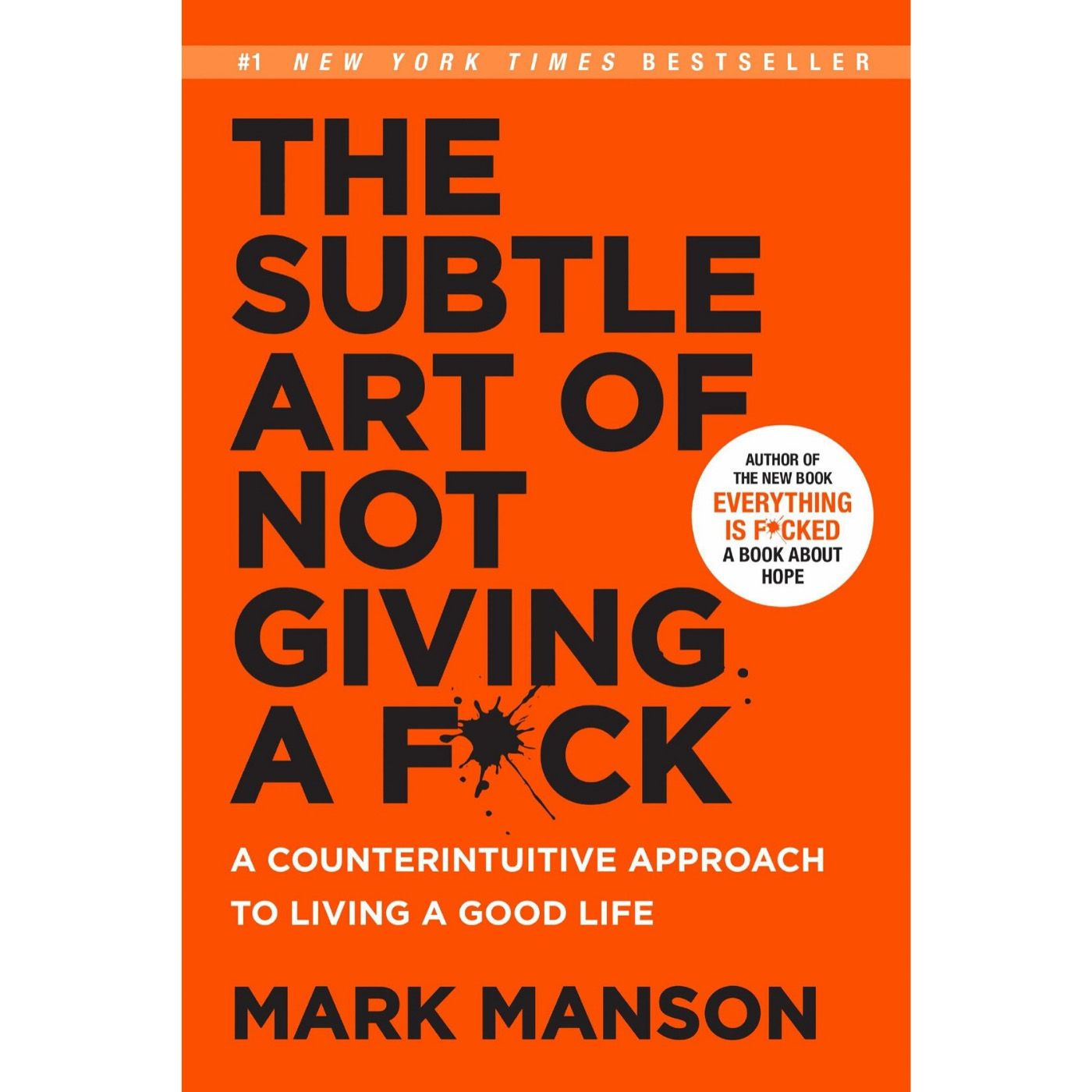The Subtle Art of Not Giving a F*ck by Mark Manson — Book Summary and Notes
Our culture today is obsessively focused on unrealistically optimistic expectations. We "must" always strive for more—more happiness, more money, and be more successful than the rest.
Our culture today is obsessively focused on unrealistically optimistic expectations. We "must" always strive for more—more happiness, more money, and be more successful than the rest.
These messages emphasise what we lack. Either you are or you are not.
- We become addicted to the unreal and fake, constantly pursuing superficial ideas of happiness and satisfaction
- We get addicted to temporary highs.
- We become frustrated when we fall short of society's expectations.
- We feel always entitled to feel good and go out of out way to avoid dealing with pain, failure, and challenges
The Book in Three Sentences 🎯:
- In life, we have a limited amount of f*cks to give. So you must choose your f*cks wisely.
- Accept that pain is an inevitable part of life and use it as a catalyst for self-improvement.
- If you want to change how you see your problems, you have to change what you value and how you measure your failure and success.

The Subtle Art of Not Giving A F*ck
A Counterintuitive Approach to Living A Good Life By Mark Manson
The Philosophical Origins
- Stoicism values reason and duty above all else
- Every action you take should be driven by a devotion to your purpose
- Be comfortable with pain, take problems less seriously, and face your fears
- Existentialism values personal choice and personal growth
- Life is meaningless, and therefore you must create your own meaning
- Make clear decisions about what you value in life
- Buddhism values acceptance and tranquility
- Accept that pain is an inevitable part of life, and you can use it as a catalyst for self-improvement
- Understand it's ok to feel bad
Choose Your F*cks Carefully
Most people struggle throughout life by giving too many f*cks in situations where f*cks do not deserve to be given. There are infinite number of ways we can discover that we're not good enough. We need to choose constructive values and standards, use them to decide what we care about most, and reject the rest.
Everything worthwhile in life is won through surmounting the associated negative experience.
The avoidance of suffering is a form of suffering itself.
What Does Not Giving a F*ck Mean?
Not giving a f*ck does not mean being apathetic, someone shaken by nothing and caving into no one. Instead, it means:
- Being comfortable with your own set of values.
- You can't be a life-changing presence for some people without being a joke to others.
- Realising that simplifying your priorities, rather than pursuing everything, actually makes you happier.
Subtlety #2: To not give a f*ck about adversity, you must first give a f*ck about something more important than adversity.
Subtlety #3: You are always choosing what to give a f*ck about
- When we're young, everything is new and exciting. Everything seems to matter so much.
- As we mature, we notice that most things have a small lasting impact on our lives. We realise how little attention people pay to the superficial details about us, and we choose not to obsess so much over time.
- In our middle age, our identity solidifies. We accept who we are. We long need to give a f*ck about everything. This process of simplification makes people happier consistently. Life is what it is.
Happiness is Misunderstood
Happiness isn't something that you can get in return for an achievement. Happiness comes from solving problems and overcoming challenges.
- Create the right conditions for happiness.
- Balance emotional urges with reasons.
- Avoid impulses that bring fleeting happiness at the cost of lasting damage, and pursue those that get long-term satisfaction.
In a society that coddles itself from the inevitable discomforts of life, we lose the benefits of experiencing healthy doses of pain — a loss that disconnects us from the reality of the world.
"Life is an endless series of Problems. The solution to one problem is merely the creation of the next one."
The purpose of emotions is to provide feedback.
- Positive emotions are rewards for taking the proper action
- Negative emotions are a call to action.
Lifelong fulfilment has to be earned through our struggles. What determines success isn't "What do you want to enjoy? The relevant question is: "What pain do you want to sustain?"
- Entrepreneurship: Appreciate the risk, the uncertainty, the repeated failures, the insane hours devoted to something that may earn absolutely nothing.
- Love: Appreciate the emotional turbulence with weathering rejections, building the sexual tension that never gets released, and staring blankly at a phone that never rings.
The Entitlement Trap
- You believe that you're entitled to feel good all the time.
- You believe that you're exceptional or different.
- "I'm awesome, and the rest of you all suck, so I deserve special treatment."
- "I suck, and the rest of you are all awesome, so I deserve special treatment."
The proper measurement of self-worth is not how a person feels about their positive experiences but rather how she feels about their negative experiences.
If you've got a problem, millions of other people have had it in the past, have it now, and are going to have it in the future. Learn from others.
- The more freedom we're given to express ourselves, the more we want to be free of having to deal with anyone who may disagree with us or upset us.
- The more convenient our lives become, the more we seem to feel entitled for them to get even better.
This flood of extreme information has conditions us to believe that exceptionalism is the new normal.
It's Okay to Be Average
Being "average" has become the new standard of failure. When a culture's measure of success is to "be extraordinary", it becomes better to be at the extreme low end of the bell curve than to be in the middle.
We shouldn't aim for mediocrity, but you should accept it when we end up average despite our best efforts. Acknowledging these realities eliminates the pressure and stress of feeling inadequate and constantly needing to compensate.
Define Your Values
Level 1: Identify Your Emotions
- We all have emotional blind spots.
Level 2: Determine Why You Feel Certain Emotions
- Understand the root cause of the emotions that overwhelm us.
Level 3: Identify the Personal Values Underlying Your Emotions
- How am I choosing to measure myself?
- By what standard am I judging myself and everyone around me?
"If you want to change how you see your problems, you have to change what you value and how you measure your failure and success."
Negative Values
Negative values are (1) factual, (2) non-constructive, and (3) out of your control:
- Pleasure: Pleasure is the simplest form of life satisfaction and, therefore, the easiest to obtain and the easiest to lose.
- Material Success: You're killing yourself working overtime for basically nothing.
- Always Being Right: They cannot take on new perspectives and empathise with others. They close themselves off to further and essential information.
- Staying Positive: Constant positivity is a form of avoidance, not a good solution to life's problems. Denying negative emotions leads to experiencing more prolonged negative emotions.
Positive Values
Positive Values are (1) reality-based, (2) socially constructive, (3) controllable:
- Taking Responsibility: for everything that happens, regardless of who's at fault.
- Accepting Uncertainty: acknowledge you might be wrong, and that you don't know everything.
- Embracing Failure: be willing to uncover your flaws and fix them so they may be improved upon.
- Practicing Rejection: say "no", and accept "no" from others.
- Reflecting on your Mortality: keep your life and values in perspective.
Taking Responsibility
We feel in control and empowered when we choose our problems or challenges.
You're Always Making Choices
- You choose the values and standards you live by.
- You choose how to interpret what happens and how to respond.
Blame exists in the past; responsibility exists in the present
- Life is like poker. A player who gets dealt a bad hand can still win.
- The players’ choice determines the outcome of the game.
- Clarity: clearly defined values help us make choices that align with them.
- Efficiency: clear values leads to clear goals.
- Transparency: more trustworthy, people are more helpful and accommodating.
- Being true to yourself. To become the person you want to be.
Accepting Uncertainty
Instead of trying to prove we're right, we should look for ways that we are wrong.
Lifelong Learning
- Learning and changing our beliefs is a lifelong growth process where we continually build on what we have known before.
- The more you acknowledge not knowing, the more you can learn.
- Accept that good and bad things will happen; either way, you'll see each situation as it comes.
Embracing Failure
- Denial — some people deny their problems. They repress their true feelings, which makes them anxious and neurotic in the long-term.
- Developing a Victim Mentality — some people blame others for their circumstances. Blame and denial provide a temporary "high", but it leads to a life of anger, helplessness, and despair.
Practicing Rejection
- If you value everything equally, then you have no values.
- Meaning in life comes from caring a lot about about a few select things.
Break the people-pleasing habits
- Say no.
- Give an honest opinion.
- Stand up for something you believe in.
- Be willing to reject and be rejected.
Entitled Partners
- Victims: They feel loved when someone saves them.
- Saviors: They feel loved when they fix the other person.
Supportive Partners
- Being honest about small things sets the stage for being honest about bigger things.
- Define the Boundary, Explanation the Boundary, Keep it Simple, Add an "or else".
- Call timeouts.
- Ask instead of complain.
- Learn your partner's apology language.
Reflecting on Morality
Morality is getting rid of superficial or self values and consider what impact your life has made on the world.
Life is Short: Spend it Wisely
- Confront the inevitability of death and focus on having better values in life.
- Time is finite; choose your f*cks wisely
- Find fulfilment
In A Nutshell: The Subtle Art of Not Giving a F*ck
- In life, we have a limited amount of f*cks to give. So you must choose your f*cks wisely.
- Accept that pain is an inevitable part of life and use it as a catalyst for self-improvement.
- If you want to change how you see your problems, you have to change what you value and how you measure your failure and success.

